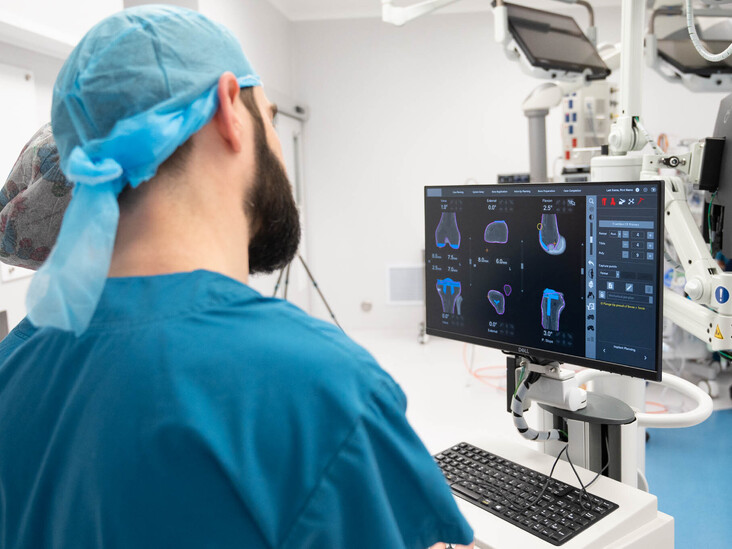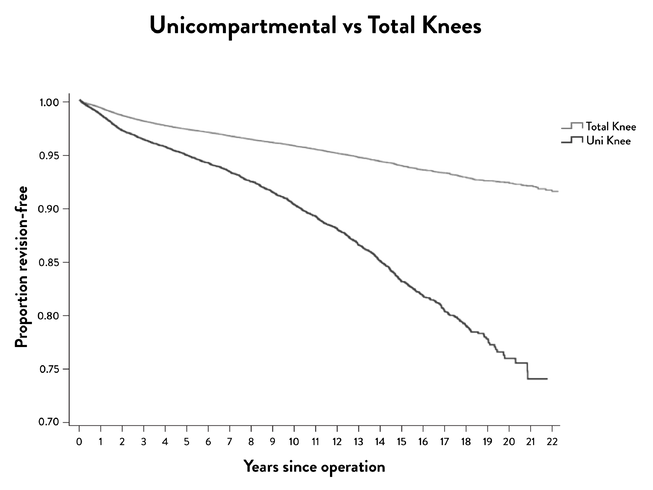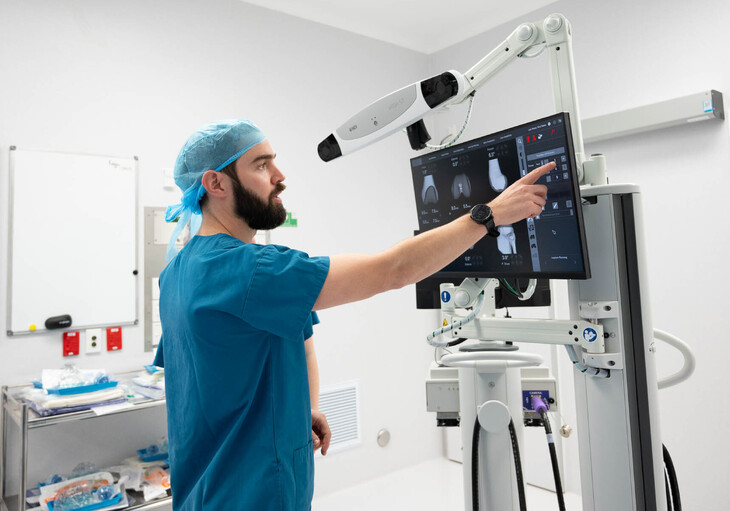Unicompartmental Knee Replacement (UKR)
Overview of unicompartmental knee replacement
This can mean:
Medial unicompartment
Lateral unicompartment
Patellofemoral unicompartment
The joint is made up of three compartments as noted above. The knee can degenerate in a single compartment or any combination.
When a single compartment develops degeneration causing pain and functional impairment while the other compartments remain healthy, unicompartmental joint arthroplasty is a treatment option.
The main advantages to considering unicompartmental arthroplasty over total joint arthroplasty are:
Smaller operation
Faster recovery
Reduced risks of complications
More natural feeling knee post-operatively
The disadvantages are:
Possible progression of disease in the other compartments: Because the other compartments in the knee are not replaced, these could go on to develop arthritis later in life, requiring further surgery.
There is a higher risk of revision of medial or lateral UKR compared to TKR: 10-year survival rates without revision are 91% for UKR and 96% for TKR, according to the NZJR.
Savov, P., Tuecking, LR., Windhagen, H. et al. Robotics improves alignment accuracy and reduces early revision rates for UKA in the hands of low-volume UKA surgeons. Arch Orthop Trauma Surg 141, 2139–2146 (2021). https://doi.org/10.1007/s00402-021-04114-5
Patellofemoral replacements
Patellofemoral replacements are an option for patients suffering from isolated patellofemoral osteoarthritis. However, they have a higher risk of revision compared to medial or lateral TKR. The most common reasons for revision include ongoing pain and arthritis developing in other parts of the knee.
Benefits of patellofemoral replacement
Smaller and shorter operation
Retaining cruiciates for a more natural feeling knee post-operatively
Fewer short-term complications
Contraindications for unicompartmental knee replacement
Inflammatory arthritis
ACL deficient knees
Severe deformity
Significant stiffness

The role of robotics in unicompartmental knee replacement
Historically, UKR was a more technically demanding operation. Those surgeons performing +10 per year had better outcomes than those performing less. Robotics has removed this issue. The accuracy and precision that robotic UKR brings allows the surgeon to make the bone cuts, place the prosthesis and balance the joint correctly every time.
10 year survival data for Robotic Arm assisted UKA
Zambianchi, F., Seracchioli, S., Franceschi, G. et al. Image-based robotic-arm assisted unicompartmental knee arthroplasty provides high survival and good-to-excellent clinical outcomes at minimum 10 years follow-up. Knee Surg Sports Traumatol Arthrosc 31, 5477–5484 (2023). https://doi.org/10.1007/s00167-023-07599-2
Outcomes
Banger M, Doonan J, Rowe P, Jones B, MacLean A, Blyth MJB. Robotic arm-assisted versus conventional medial unicompartmental knee arthroplasty: five-year clinical outcomes of a randomized controlled trial. Bone Joint J. 2021 Jun;103-B(6):1088-1095. doi: 10.1302/0301-620X.103B6.BJJ-2020-1355.R2. PMID: 34058870; PMCID: PMC8153511.
Return to Sport
Daffara, V., Zambianchi, F., Festa, E. et al. High return to sport rate in patients undergoing image-based robotic arm assisted unicompartmental knee arthroplasty. Arch Orthop Trauma Surg (2023). https://doi.org/10.1007/s00402-023-05141-0
Faster Recovery
Shearman, A.D., Sephton, B.M., Wilson, J. et al. Robotic-assisted unicompartmental knee arthroplasty is associated with earlier discharge from physiotherapy and reduced length-of-stay compared to conventional navigated techniques. Arch Orthop Trauma Surg 141, 2147–2153 (2021). https://doi.org/10.1007/s00402-021-04207-1
Better Alignment
Lonner JH, John TK, Conditt MA. Robotic arm-assisted UKA improves tibial component alignment: a pilot study. Clin Orthop Relat Res. 2010 Jan;468(1):141-6. doi: 10.1007/s11999-009-0977-5. Epub 2009 Jul 11. PMID: 19593669; PMCID: PMC2795844.
Reduced Complications
Sun Y, Liu W, Hou J, et al. Does robotic-assisted unicompartmental knee arthroplasty have lower complication and revision rates than the conventional procedure? A systematic review and meta-analysis. BMJ Open 2021;11:e044778. doi: 10.1136/bmjopen-2020-044778





